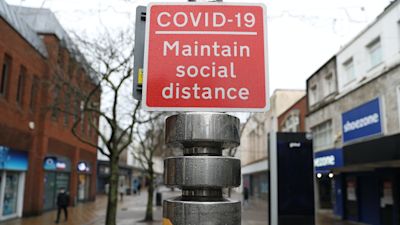"Freedom day": Warnings of caution as Covid restrictions ease across the region

Report & briefing from Health Correspondent Helen Ford
The 19th July, dubbed "Freedom Day" saw most remaining Covid restrictions now lifted by the Government.
However, North East health professionals are still urging people to be cautious with infection rates remaining high in the region.
Lockdown rules in England: What's changing from July 19
What has happened to social distancing and the rule of six?
What has happened to social distancing and the rule of six?
The 'one metre plus' rule has been scrapped entirely, as of July 19 in England. However, some guidance to maintain social distancing in certain situations will remain in place of the legal restrictions.
Social distancing guidance will continue if someone is Covid positive and self-isolating, or in airports, or other ports of entry, to avoid travellers arriving from amber or red-list countries mixing with those from green list areas.
Limits on social contact in England have disappeared, meaning the end of the rule of six indoors and the limit of 30 people for outdoor gatherings.
Do I still need to wear a face mask?
Do I still need to wear a face mask?
There is now no legal requirements to wear face coverings - but guidance still encourages using masks in some settings, including hospitals, healthcare settings and in crowded enclosed public spaces.
Has the working from home guidance changed?
Has the working from home guidance changed?
The guidance on working from home has gone. It's ultimately down to employers to decide whether to keep staff at home or in the office, but the government say employers are able to plan the return of staff to the workplace.
What about weddings and funerals?
What about weddings and funerals?
The current limits on numbers of people who can attend weddings, funerals and other life events has ended.
What's happening in Wales, Scotland and Northern Ireland?
What's happening in Wales, Scotland and Northern Ireland?
The changes to Covid rules announced by Boris Johnson, only impact England and will not change regulations in Northern Ireland, Wales or Scotland.
The Welsh Government “would like to move together” with other parts of the UK in lifting coronavirus restrictions but will only do so if it is “right for Wales”, health minister Eluned Morgan said on Monday 5 July.
As of July 19, restrictions in Scotland have eased, with all areas of the country moving to level 0. The government is aiming to lift all major restrictions in Scotland by August 9.
In Northern Ireland, some significant restrictions have already been eased including allowing the resumption of live music and the lifting of caps on organised outdoor gatherings.
Professor Peter Kelly from Public Health England in the North East wants the public to remember that the virus still exists despite restrictions lifting.
Professor Peter Kelly, Public Health England in the North East
The North East Ambulance Service says it is currently experiencing "unprecedented demand", pleading for people to only call when necessary. The service says it is expecting demand to increase further as Covid restrictions ease.
The North East still remains one of the areas of the country with the highest Covid infection rates.
From figures published on Friday, in the seven days to 12 July, 290 out of 315 local authorities in England saw a week-on-week rise in rates.
Marion Dickson is Executive Director of Nursing and Midwifery at Northumbria NHS Healthcare Trust. She is urging everyone to 'play their part' as pressure begins to mount on hospitals.
South Tyneside still has some of the highest Covid case rate in the country - with 1,978 new cases in the seven days to 12 July.
Three out of the top five areas with the biggest week-on-week rises are on Teesside: Redcar & Cleveland, Middlesbrough, Allerdale, Hartlepool, and Melton.
The top 10 areas for the highest Covid case rates now stand as (per 100,000 people):
South Tyneside - 1310.1 up from 1098.2
Redcar and Cleveland - 1017.9 up from 508.9
Hartlepool - 1015.3 up from 656.6
Middlesbrough - 1014.3 up from 518.5
Sunderland - 986.7 up from 800.8
North East Lincolnshire - 955.7 up from 823.5
Gateshead - 951.7 up from 787.9
Newcastle upon Tyne - 862.6 up from 782.0
Stockton-on-Tees - 784.4 up from 462.6
County Durham - 766.7 up from 677.8